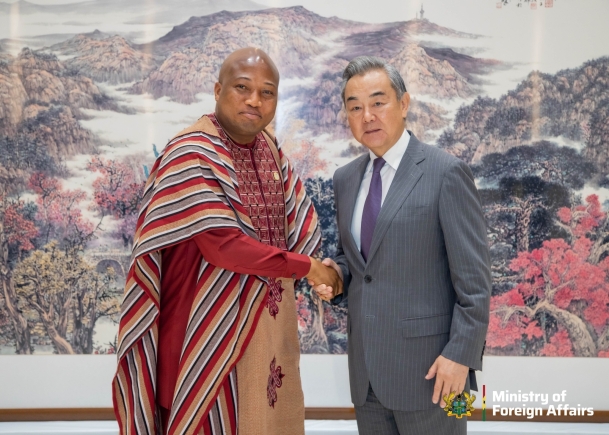Ghana’s Foreign Affairs Minister, Hon. Samuel Okudzeto Ablakwa, following an engagement with his counterpart, Wang YI, has hinted that Ghana and China are poised to leverage their partnership for mutual benefits. In addition to the 0 per cent tariff China has offered on all exports from Ghana, the two countries are exploring new industrial projects.
The Ministerial meeting of coordinators on the implementation of the follow-up actions of the Forum on China-Africa Cooperation (FOCAC), held in Changsha, convened foreign ministers from FOCAC member countries. Highlights and notes from the meeting are briefly discussed below.
0% tariff to least developed countries
At the 2024 FOCAC, China announced its commitment to unilaterally expand market access by granting zero-tariff treatment to 100 per cent of products originating from least developed countries (LDCs), with which it maintains diplomatic relations. Additionally, China will broaden access to African agricultural products, strengthen cooperation in e-commerce, and implement the China-Africa Quality Enhancement Programme.
One year on, China has fulfilled its FOCAC commitment to implement zero-tariff treatment. The China-Africa Quality Enhancement Programme is expected to enable a greater number of African products— particularly agricultural produce to meet China’s quality standards, which have previously posed a barrier to African exports entering the Chinese market.
Leveraging Ghana’s bauxite for an integrated aluminium industry powered by modern rail infrastructure
Past agreement
In May 2018, Ghana signed the Sinohydro agreement, a barter arrangement intended to exchange the country’s bauxite resources for infrastructure projects valued at $2 billion. Consequently, the Parliament of Ghana in July 2018 approved the Master Project Support Agreement (MPSA) permitting the country’s bauxite resources to be used to secure projects identified as priority infrastructure projects.
As part of the agreement, Ghana was expected to establish a bauxite processing plant where it will repay the loan with the proceeds from the sale of the refined bauxite. Ghana Bauxite Company production is estimated to have reached 1.8 million tons in 2024 with plans to build a refinery in Awaso, where bauxite was first discovered in the country. Since the establishment of the Ghana Bauxite Company in 1940, the company and the country have yet to successfully build a bauxite refinery.
This novel loan agreement at the time, was expected to ensure that the loan will not add to the country’s debt stock.
The 2018 MPSA encountered challenges, including delays in completion and incomplete projects. However, it ultimately delivered on monumental projects such as the Tamale interchange.
What to Expect under FOCAC
If Ghana succeeds in establishing a bauxite refinery and begins exporting refined bauxite, it will stand to benefit from the zero-tariff policy announced by China. As China aims to reach a total of $300 billion in imports from Africa, Ghana will be well-positioned to take advantage of this commitment—especially with respect to the Sinohydro agreement.
In addition, Ghana also stands to benefit from the estimated $10 billion China has pledged its businesses will invest in Africa. An integrated aluminium industry is expected to drive investment into the country.
It is recommended that the modern rail infrastructure, expected to power this integrated aluminium industry, does not take the shape of colonial rail infrastructure which only connected extractive sites to ports.
New or old bauxite deal?
It remains uncertain whether Ghana’s new administration will continue with the existing bauxite agreement, seek to revise its terms, or pursue an entirely new arrangement with China.
Nevertheless, the Sinohydro agreement offers lessons that the Government of Ghana should carefully consider, in deciding the nature of this new industrial arrangement with China.
Electric car manufacturing plant in Ghana supported by Ghana’s lithium deposits
China, during the 2024 FOCAC announced its willingness to help Africa build a ‘green growth engine’, narrow the energy accessibility gap, adhere to the principle of common but differentiated responsibilities, and jointly promote a global green and low-carbon transformation.
The initiative to manufacture electric vehicles in Ghana against the backdrop of Ghana’s lithium deposits aligns with the green growth engine commitment made at the FOCAC. China also expressed its willingness to jointly embrace the new scientific and technological revolution and industrial transformation. The shift towards EVs promises economic gains as well as environmental and climate gains for Ghana. Ghana’s strategic location could enable it to become a suitable net exporter of EVs in the sub-region.
Among other things, Ghana will be better positioned to engage in global green and climate-smart initiatives and discourse, with the establishment of EV manufacturing plants and as a lithium-rich country.
Signing of a special economic partnership agreement
The China-Africa Changsha declaration on upholding solidarity and cooperation of the global south is a follow-up action gathering, to advance the full implementation of the Beijing Declaration on jointly building an all-weather Africa-China community, with shared future for the new era. This gathering is guided by the consensus reached during the 2024 FOCAC Summit.
At the 2024 summit, China expressed its readiness to, through negotiations, sign the agreement of China-Africa Economic Partnership for Shared Development.
It is expected that African countries continue to engage and sign these partnership agreements with Agenda 2063 in mind.

